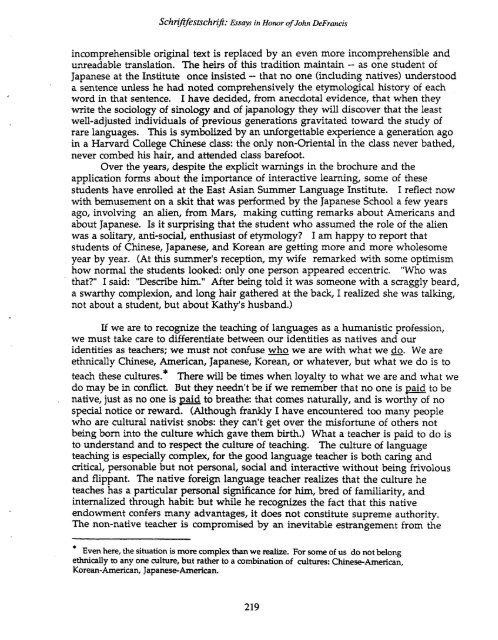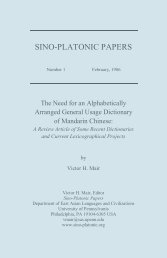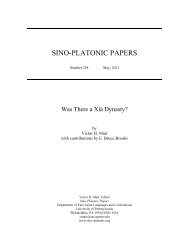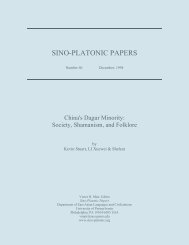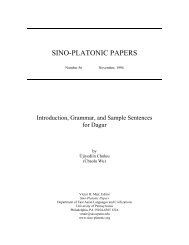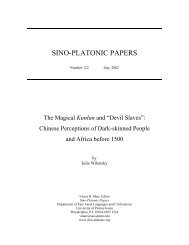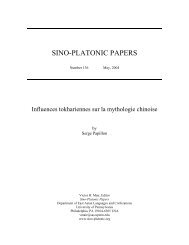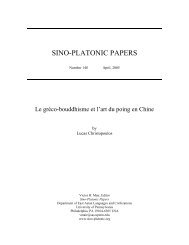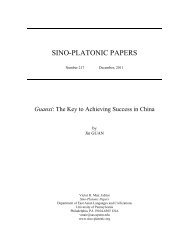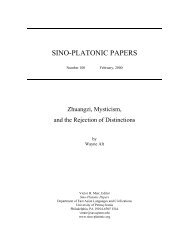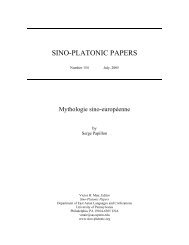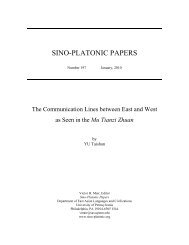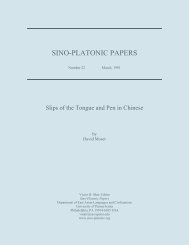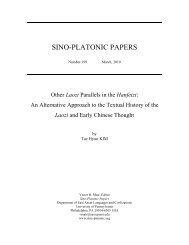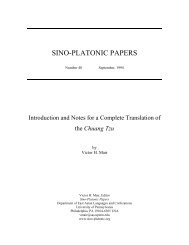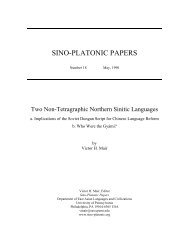Essays on Writing and Language in Honor - Sino-Platonic Papers
Essays on Writing and Language in Honor - Sino-Platonic Papers
Essays on Writing and Language in Honor - Sino-Platonic Papers
You also want an ePaper? Increase the reach of your titles
YUMPU automatically turns print PDFs into web optimized ePapers that Google loves.
Schriftfesrschri#: Ersap <strong>in</strong> H<strong>on</strong>or of John &Francis<br />
<strong>in</strong>comprehensible orig<strong>in</strong>al text is replaced by an even more <strong>in</strong>comprehensible <strong>and</strong><br />
unreadable translati<strong>on</strong>. The heirs of this traditi<strong>on</strong> ma<strong>in</strong>ta<strong>in</strong> -- as <strong>on</strong>e student of<br />
Japanese at the Institute <strong>on</strong>ce <strong>in</strong>sisted - that no <strong>on</strong>e (<strong>in</strong>clud<strong>in</strong>g natives) understood<br />
a sentence unless he had noted comprehensively the etymological history of each<br />
word <strong>in</strong> that sentence. I have decided, from anecdotal evidence, that when they<br />
write the sociology of s<strong>in</strong>ology <strong>and</strong> of japanology they will discover that the least<br />
well-adjusted <strong>in</strong>dividuals of previous generati<strong>on</strong>s gravitated toward the study of<br />
rare languages. This is symbolized by an unforgettable experience a generati<strong>on</strong> ago<br />
<strong>in</strong> a Harvard College Ch<strong>in</strong>ese class: the <strong>on</strong>ly n<strong>on</strong>-Oriental <strong>in</strong> the class never bathed,<br />
never combed his hair, <strong>and</strong> attended class barefoot.<br />
Over the years, despite the explicit warn<strong>in</strong>gs <strong>in</strong> the brochure <strong>and</strong> the<br />
applicati<strong>on</strong> forms about the importance of <strong>in</strong>teractive learn<strong>in</strong>g, some of these<br />
students have enrolled at the East Asian Summer <strong>Language</strong> Institute. I reflect now<br />
with bemusement <strong>on</strong> a skit that was performed by the Japanese School a few years<br />
ago, <strong>in</strong>volv<strong>in</strong>g an alien, from Mars, mak<strong>in</strong>g cutt<strong>in</strong>g remarks about Americans <strong>and</strong><br />
about Japanese. Is it surpris<strong>in</strong>g that the student who assumed the role of the alien<br />
was a solitary, anti-social, enthusiast of etymology? I am happy to report that<br />
students of Ch<strong>in</strong>ese, Japanese, <strong>and</strong> Korean are gett<strong>in</strong>g more <strong>and</strong> more wholesome<br />
year by year. (At this summer's recepti<strong>on</strong>, my wife remarked with some optimism<br />
how normal the students looked: <strong>on</strong>ly <strong>on</strong>e pers<strong>on</strong> appeared eccentric. "Who was<br />
that?" I said: "Describe him." After be<strong>in</strong>g told it was some<strong>on</strong>e with a scraggly beard,<br />
a swarthy complexi<strong>on</strong>, <strong>and</strong> l<strong>on</strong>g hair gathered at the back, I realized she was talk<strong>in</strong>g,<br />
not about a student, but about Kathy's husb<strong>and</strong>.)<br />
If we are to recognize the teach<strong>in</strong>g of languages as a humanistic professi<strong>on</strong>,<br />
we must take care to differentiate between our identities as natives <strong>and</strong> our<br />
identities as teachers; we must not c<strong>on</strong>fuse who we are with what we &. We are<br />
ethnically Ch<strong>in</strong>ese, American, Japanese, Korean, or whatever, but what we do is to<br />
teach these cultures.* There will be times when loyalty to what we are <strong>and</strong> what we<br />
do may be <strong>in</strong> c<strong>on</strong>flict. But they needn't be if we remember that no <strong>on</strong>e is @ to be<br />
native, just as no <strong>on</strong>e is paid to breathe: that comes naturally, <strong>and</strong> is worthy of no<br />
special notice or reward. (Although frankly I have encountered too many people<br />
who are cultural nativist snobs: they can't get over the misfortune of others not<br />
be<strong>in</strong>g born <strong>in</strong>to the culture which gave them birth.) What a teacher is paid to do is<br />
to underst<strong>and</strong> <strong>and</strong> to respect the culture of teach<strong>in</strong>g. The culture of language<br />
teach<strong>in</strong>g is especially complex, for the good language teacher is both car<strong>in</strong>g <strong>and</strong><br />
critical, pers<strong>on</strong>able but not pers<strong>on</strong>al, social <strong>and</strong> <strong>in</strong>teractive without be<strong>in</strong>g frivolous<br />
<strong>and</strong> flippant. The native foreign language teacher realizes that the culture he<br />
teaches has a particular pers<strong>on</strong>al significance for him, bred of familiarity, <strong>and</strong><br />
<strong>in</strong>ternalized through habit: but while he recognizes the fact that this native<br />
endowment c<strong>on</strong>fers many advantages, it does not c<strong>on</strong>stitute supreme authority.<br />
The n<strong>on</strong>-native teacher is compromised by an <strong>in</strong>evitable estrangement from the<br />
* Even here, the situati<strong>on</strong> is more complex than we realize. For some of us do not bel<strong>on</strong>g<br />
ethnically to any <strong>on</strong>e culture, but rather to a comb<strong>in</strong>ati<strong>on</strong> of cultures: Ch<strong>in</strong>ese-American,<br />
Korean-American, Japanese-American.


